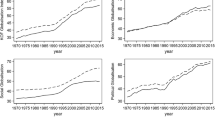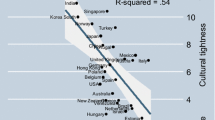Abstract
Globalization has increased the need for managers (and future managers) to predict the potential for country corruption. This study examines the relationship between Hofstede's cultural dimensions and how country corruption is perceived. Power distance, individualism and masculinity were found to explain a significant portion of the variance in perceived corruption. A significant portion of country's risk, trade flow with U.S.A., foreign investment, and per capita income was explained by perceived corruption.
Similar content being viewed by others
References
Adler, N.: 2002, International Dimensions of Organizational Behavior (4th ed.) (South-Western, Cincinnati, OH).
Armstrong, R. A.: 1996, ‘The Relationship Between Culture and Perception of Ethical Problems in International Marketing’, Journal of Business Ethics 15, 1199–1208.
Bond, M. H., K. W. K. Leung and R. A. Giacalone: 1985, ‘How Responses to Verbal Insult Related to Cultural Collectivism and Power Distance?’, Journal of Cross-Cultural Psychology 16, 11–127.
Brasz, H. A.: 1970, ‘The Sociology of Corruption’, in A. J. Heidenheimer (ed.), Political Reading in Comparative Analysis (Holt Reinhart, New York).
Brunetti, A.: ‘Political Variables in Cross-Country Growth Analysis’, Working Paper (Harvard University, Cambridge, MA).
Davids, M.: 1999, ‘Global Standards, Local Problems’, Journal of Business Strategy, 38–43.
Dijksterhuis, A. and V. Knippenberg: 1998, ‘The Relation Between Perception and Behavior, or How Win a Game of Trivial Pursuit’, Journal of Personality & Social Psychology 74, 865.
Donaldson, T.: 1996, ‘Values in Tension: Ethics Away from Home’, Harvard Business Review (September-October), 48–62.
Dukerich, J. M. and S. M. Carter: 1999, ‘Distorted Images and Reputation Repair’, in M. Schultz, M. J. Hatch and M. Larsen (eds.), The Expressive Organization.
Dun & Bradstreet: 1999, ‘Guide to Doing Business Around the World’.
Elliott, M.: 1994, ‘Corruption’, Newsweek (November 14), 40–42.
Fons, J. S.: 1999, ‘Improving Transparency in Asian Banking Systems’, Working paper.
Francesco, A. M. and B. A. Gold: 1998, International Organizational Behavior (Prentice-Hall, Englewood Cliffs, NJ).
Frank, B. and G. G. Schulze: 1998, ‘How Tempting is Corruption? More Bad News about Economists’, Working paper.
Getz, K. A. amd R. J. Volkema: 2001, ‘Culture, Perceived Corruption, and Economics,’ Business & Society 40(1), 7–31.
Gómez-Mejía, L. R., D. R. Balkin and R. L Cardy: 1998, Managing Human Resources (Prentice-Hall, Englewood Cliffs, NJ), pp. 531–535.
Goudie, A. W. and D. Stasavage: 1997, Corruption: The Issues (Organization for Economic Cooperation and Development, Paris).
Greenberger, R. S.: 1995, ‘U.S. Firms Lost Business Due to Bribes’, Wall Street Europe (October 5), 2.
Hampden-Turner, C. M.: 2000, Building Cross-Cultural Competence (Yale University Press, New Haven).
Harzing, A. and G. Hofstede: 1996, ‘Planned Change in Organizations: The Influence of National Culture’, in P. Bamberger and M. Erez (eds.), Research in The Sociology of Organizations: Cross-Cultural Analysis of Organizations ( JAI Press, New York).
Hofstede, G.: 1980, Culture's Consequences: International Differences in Work-Related Values (Sage Publications, New York).
Hofstede, G. and M. Bond: 1988, ‘The Confucius Connection: From Cultural Roots to Economic Growth’, Organizational Dynamics 16, 5–21.
Hofstede, G.: 1991, Culture and Organizations: Software of the Mind (McGraw-Hill, New York).
Hofstede, G.: 1992, ‘Cultural Constraints in Management Theories’, Annual Meeting of the Academy of Management (Las Vegas, Nevada).
Holman, M.: 1994, ‘A Cancer in Business’, The Financial Times, n32485, S18.
Husted, B. W.: 1999, ‘Wealth, Culture, and Corruption’, Journal of International Studies 20, 339–360.
Jackall, R.: 1988, Moral Mazes: The World of Corporate Managers (Oxford University Press, New York).
Jaeger, A.: 1986, ‘Organization Development and National Culture: Where is the Fit?’, Academy of Management Review 11(1), 178–190.
Jain, A. K.: 1998, Economics of Corruption (Kluwer Academic Publishers, Boston).
Kehoe, W. J.: 1998, ‘The Environment of Ethics in Global Business’, Journal of Business and Behavioral Science 2 (Fall), 47–56.
Klitgaard, R.: 1998, ‘International Cooperation against Corruption’, Finance & Development, 3–6.
Lambsdorff, J. G.: 2001, ‘How Corruption in Government Affects Public Welfare-A Review of Theories’, Discussion paper 9, Center for Globalization and Europeanization of the Economy.
Lambsdorff, J. G.: 1997, ‘First Enquiry into the Bribery Propensity of Leading Exporting Nations’, European Journal of Development Research 10(10).
Lester, D.: 1999, ‘A Comment on Urbanism and Crime’, Cross-Cultural Research 33(1).
Levine, Loayza, & Beck, 2000, Financial Intermediation and Growth: Causality and Causes. Economic Growth. Worldbank.com.
Mead, R.: 1998, International Management, 2nd Ed. (Blackwell, Malden, MA).
Mankiw, N. G.: 2000, Principles of Economics, 2nd Ed. (Harcourt College Publishers, Fort Worth), p. 123.
Mauro, P.: 1995, ‘Corruption and Growth’, Quarterly Journal of Economics, 681–712.
Mauro, P.: 1998, ‘Corruption: Causes, Consequences, and Agenda for Further Research’, Finance & Development, 11–14.
Nyaw, N. I. and I. Ng: 1994, ‘A Comparative Analysis of Ethical Beliefs: A Four Country Study’, Journal of Business Ethics 13, 543–555.
Radebaugh. L. H. and S. J. Gray: 1997, International Accounting and Multinational Enterprises, 4th ed. (John Wiley & Sons, New York).
Robertson, C. and P. A. Fadil: 1999, ‘Ethical Decision Making in Multinational Organizations: A Culture-Based Model’, Journal of Business Ethics 19, 385–392.
Rose-Ackerman, S: 1999, Corruption and Government, Causes, Consequences, and Reforms (Cambridge University Press, Cambridge).
Sondergaard, M.: 1994, ‘Hofstede's Consequences: A Study of Reviews, Citations, and Replications’, Organizational Studies, 447–456.
Steidlmeier, P.: 1999, ‘Gift Giving, Bribery and Corruption: Ethical Management of Business Relationships in China’, Journal of Business Ethics 20, 121–132.
The Economist, 1999, ‘Stop the Rot’, January 16, 19.
The Economist, 1999, ‘Honest Trade’, January 16, 22–24.
Tanzi, V. and H. Davoodi: 1997, ‘Corruption, Public Investment, and Growth’, International Monetary Fund, Working paper, 97/139.
Transparency International: 2000, Corruption Perception Index, Retrieved from www.transparency.de.
Trompenaars, F. and C. M. Hampden-Turner: 1996, Riding the Waves of Culture: Understanding Cultural Diversity in Business, 2nd. Ed. (McGraw-Hill, New York).
Weaver, G. R.: 2001, ‘Ethics Programs in Global Business: Culture's Role in Managing Ethics’, Journal of Business Ethics 30, 3–15.
Wild, J. J., K. L Wild and J. C. Y. Han: 2000, International Business: An Integrated Approach (Prentice-Hall, Upper Saddle River, NJ).
Winch, G. and C. Millar: 1997, ‘Culture and Organization: The Case of Transmanche-Link’, British Journal of Management 8, 237–250.
Winsdor, D. and K.A. Getz: 1999, ‘Regional Market and the Development of Global Norms for Enterprise Conduct’, Business & Society 38(4), 415–450.
Worldbank.com, World Development Indicators 2000 WWW.Worldbank.org/publicsector/anticorrrupt
Author information
Authors and Affiliations
Rights and permissions
About this article
Cite this article
Davis, J.H., Ruhe, J.A. Perceptions of Country Corruption: Antecedents and Outcomes. Journal of Business Ethics 43, 275–288 (2003). https://doi.org/10.1023/A:1023038901080
Issue Date:
DOI: https://doi.org/10.1023/A:1023038901080




